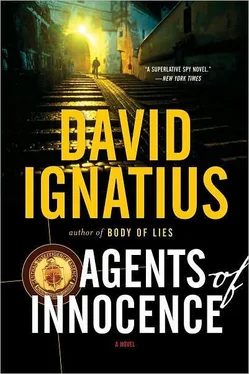David Ignatius - Agents of Innocence
Здесь есть возможность читать онлайн «David Ignatius - Agents of Innocence» весь текст электронной книги совершенно бесплатно (целиком полную версию без сокращений). В некоторых случаях можно слушать аудио, скачать через торрент в формате fb2 и присутствует краткое содержание. Жанр: Шпионский детектив, на английском языке. Описание произведения, (предисловие) а так же отзывы посетителей доступны на портале библиотеки ЛибКат.
- Название:Agents of Innocence
- Автор:
- Жанр:
- Год:неизвестен
- ISBN:нет данных
- Рейтинг книги:3 / 5. Голосов: 1
-
Избранное:Добавить в избранное
- Отзывы:
-
Ваша оценка:
- 60
- 1
- 2
- 3
- 4
- 5
Agents of Innocence: краткое содержание, описание и аннотация
Предлагаем к чтению аннотацию, описание, краткое содержание или предисловие (зависит от того, что написал сам автор книги «Agents of Innocence»). Если вы не нашли необходимую информацию о книге — напишите в комментариях, мы постараемся отыскать её.
Agents of Innocence — читать онлайн бесплатно полную книгу (весь текст) целиком
Ниже представлен текст книги, разбитый по страницам. Система сохранения места последней прочитанной страницы, позволяет с удобством читать онлайн бесплатно книгу «Agents of Innocence», без необходимости каждый раз заново искать на чём Вы остановились. Поставьте закладку, и сможете в любой момент перейти на страницу, на которой закончили чтение.
Интервал:
Закладка:
“Nothing.”
“But won’t they try to do something about Jamal?”
“I have no idea,” said Stone. “I can’t predict what anyone will do. Not the Israelis. Not us. Not our Palestinian friend.”
“What is he, exactly?” asked Rogers.
“I beg your pardon?”
“I mean, is PECOCK an agent? An asset? A contact? What sort of relationship do we have with him?”
“Ah, yes,” said Stone. “Sticky wicket. What is this all about? Strictly for bookkeeping purposes, we will treat what took place yesterday as a recruitment, even though it wasn’t one in the usual sense. We will enroll this fellow immediately as an active agent, assuming that he follows through in Rome. The fact that he doesn’t consider himself an agent is fine.”
“That doesn’t pose any problem?” asked Rogers, remembering all the consternation this same question had provoked two years earlier in the discussions with Marsh and Stone.
“No problem whatsoever,” replied Stone serenely.
“Forgive me for asking, but does that mean the Palestinian won the argument?”
“Nobody won,” said Stone. “It simply means that we have learned our lesson and will not insist on control. In essence, we are accepting his definition of the relationship. If he asks, you should encourage him to believe that we have embarked on a sort of ‘liaison’ with him as a senior inteligence officer of Fatah. We have such arrangements with all sorts of disagreeable people. As I say, it isn’t a problem.”
“Yes, sir,” said Rogers.
“Good,” said Stone, rising from his chair.
“Can I ask one more question?”
“Of course.”
“Do you think that the Palestinian is involved in Black September?”
“Possibly.” said Stone. “Quite probably.”
“Does that bother you?”
“What do you mean?”
“Does it bother you that we are working with a terrorist?”
“Oh,” said Stone.
He turned and gazed out the window.
“Let me answer your question frankly, and you will forget that I ever said these words. Morality in the abstract is too large a problem for me to get my arms around. I leave it to moral philosophers. What I do understand is the practical matter of protecting the lives of American citizens. I have no doubt-none whatsoever-that the relationship we are embarking on will serve that goal. The rest is too complicated.”
PART VIII
June-November 1972
35
Tel Aviv; June 1972
Yakov Levi’s desk at Mossad headquarters looked out on the disorderly urban landscape of Tel Aviv. The building was in the center of Tel Aviv, near the old Haifa railway station, in the midst of the noise and commotion of the city. Levi was settling into his new job as the desk officer handling intelligence about the Palestinian guerrillas. He was still savoring his transformation. He was a hero. He had an office. He was home.
Levi gloried in the ordinariness of his new life. In Beirut he had gone to the office each day trussed in a silk tie and a business suit. Here he wore an open-neck shirt, loose-fitting gabardine slacks, and, in summer, a pair of sandals. Levi’s body seemed to relax as well. His hair lost the tight, wiry curl of Beirut and became softer and looser. The knot in his stomach also seemed to loosen and he stopped chewing antacid pills. He spoke Hebrew all day and night and revelled in it. When newly arrived immigrants approached him on the street speaking English or French, he would feign incomprehension.
Levi liked taking long walks at lunchtime. He would leave the Mossad headquarters building and walk down Arlosoroff Street toward the sea. He would pass Dizengoff Street, where many of the fine shops and stores were located, then continue past Ben Yehuda Street until he reached the beach and the Mediterranean. How different the sea looked here than it had in Beirut. So much calmer and cleaner, breaking on the soft sand of Israel rather than the rocky coast of Lebanon.
What Levi couldn’t quite fathom as he took these walks through the city was that all of the people around him were Jews! The people watching the movie in the theater on Ben Yehuda; the women in the department stores, the sales ladies and the customers, too; and the beautiful girls on the beach with golden brown skin, and the men playing paddle ball who were trying so hard to impress them. They were all Jews. That was the miracle of it. There was no one else to impress, to seduce or be seduced by.
The first few months he was back in Israel, Levi sometimes acted a little crazy. He went one day to a kiosk on Dizengoff Street that sold hand-lettered T-shirts. Levi asked the shirt man to make one that said in Hebrew: “The Arabs can go to Hell!” He wore it back to the office where a colleague told him gently to take it off.
Israel in 1972 was a country that, like Levi, was trying to learn how to relax. The great battles to establish the state had been fought and won. The problems now were of less heroic dimensions, like those of most other countries. The effort to fill the land with people had brought a huge migration of poor Sephardic Jews from Morocco. As a result, there were now rich and poor Jews in the land of Israel. The rich ones were white and from Europe and the poor ones were black and from North Africa. And there were the problems that result from being powerful: The 1967 war had annexed vast amounts of land, far larger than the nation itself, which had to be policed and administered. It was a new sensation for Israelis, to act as an occupying army and see the looks of fear and hatred on the faces of their defeated enemies. Why do they hate us so? the Israelis wondered. We are only fighting for our right to exist.
A new word came into general use during the early 1970s to explain what the Israelis were fighting against. It wasn’t the Egyptians or the Syrians, who had already been trounced. It certainly wasn’t the Palestinians, whose name most Israelis preferred not to pronounce. It was the “terrorists.” They were the enemy of Israel, and of the whole world.
Israel in 1972 revelled in its ordinariness, but also feared it. The country was pulled in two directions at once: inward, toward the particular and unique identity of the Jewish people, which Judaism has celebrated throughout history; and outward, toward universal values and emotions.
Levi wondered whether that was the paradox of modern Israel: If the Jews were now like everyone else, with a state and army of their own, how then were they still special and different from everyone else? Had they been chosen by God to be, after 5,000 years of suffering, a people with the ordinary problems of combating terrorism, maintaining defensible borders, and administering occupied lands?
Levi threw himself into his new job. He had arrived home just as the trauma of Black September was beginning, so there was plenty of work in his department. He spent the day collating information, analyzing it, struggling to see the pattern in the lengthening string of terrorist operations in Europe. He combed the files looking for the names, dates, and places that would help solve the riddle of Black September.
It was slow going. Some days he spent so much time looking at the pictures of Palestinian suspects, reading the transcripts of intercepted Arabic communications, and analyzing the Lebanese press that he wondered whether he had really left Beirut after all.
Levi worked in a section with ten other officers. He wasn’t the most senior man but, thanks to his recent tour in Beirut, he was the most experienced analyst of the fedayeen organizations, and the other officers deferred to him. Levi gradually realized, too, that the Old Guard of Mossad regarded him as one of their own. Levi wasn’t sure why-perhaps it was his European background-but he was pleased. Things like that mattered a great deal in the Mossad. There was no private club in the world that had a more elaborate status hierarchy than the Israeli security service.
Читать дальшеИнтервал:
Закладка:
Похожие книги на «Agents of Innocence»
Представляем Вашему вниманию похожие книги на «Agents of Innocence» списком для выбора. Мы отобрали схожую по названию и смыслу литературу в надежде предоставить читателям больше вариантов отыскать новые, интересные, ещё непрочитанные произведения.
Обсуждение, отзывы о книге «Agents of Innocence» и просто собственные мнения читателей. Оставьте ваши комментарии, напишите, что Вы думаете о произведении, его смысле или главных героях. Укажите что конкретно понравилось, а что нет, и почему Вы так считаете.












